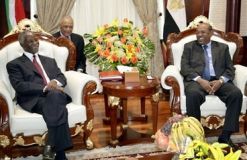South African Mbeki in Sudan for talks on Darfur peace force
April 10, 2007 (KHARTOUM) — South African President Thabo Mbeki arrived in Khartoum on Tuesday to join the global push for UN peacekeepers in Darfur, amid fears of a regional spillover after clashes between Sudan and Chad.
 President Omar al-Beshir greeted Mbeki and his Foreign Minister Nkosazana Dlamini-Zuma at the airport and the two were expected to hold talks Tuesday evening.
President Omar al-Beshir greeted Mbeki and his Foreign Minister Nkosazana Dlamini-Zuma at the airport and the two were expected to hold talks Tuesday evening.
Mbeki will also head to Juba, the capital of South Sudan for talks with first Vice-President Salva Kiir.
He was expected to press al-Beshir to accept UN peacekeepers in Darfur to boost an African Union (AU) force that has failed to stem violence there, though this was dismissed by Khartoum.
“There will be no pressure” over Darfur, the minister of state for foreign affairs, Sammani al-Wassila, told reporters.
The international community is seeking to persuade Khartoum to accept the plan put forward by former UN chief Kofi Annan and repeatedly rejected by Beshir, who has accuses the West of harbouring neo-colonial ambitions.
The conflict now risks spilling over into neighbouring Chad and the Central African Republic.
On Monday, about 30 fighters from the two sides were killed in clashes when the Chadian army crossed the border into Sudan in pursuit of rebels, before being beaten back by Sudanese troops, said a Chadian official.
Sudan said 17 of its soldiers were killed in the clashes.
The Chadian government itself at first denied its forces had crossed the frontier but on Tuesday acknowledged they had done so in hot pursuit.
The skirmish came after deadly battles between the Chadian army and rebels earlier in the day in eastern Chad, less than a week after government forces bombed rebel positions in the east.
The UN refugee agency, meanwhile, described “apocalyptic” scenes in two Chadian villages following attacks last week blamed on Sudan’s Janjaweed militia that had claimed between 200 and 400 lives.
Sudan on Tuesday accused Chad of violating border agreements reached between the countries in Libya last year.
“The Chadian government has shown no inclination to respect these accords,” said the minister of state for foreign affairs, Ali Karti, in the presence of the ambassadors of Chad, Libya and Eritrea, state radio reported.
Karti said his ministry had asked the Chadian ambassador for a written explanation from his government of “what happened, and reserves the right to respond to this serious violation at the appropriate time and place”.
Eritrea and Libya helped broker the February 2006 Tripoli agreement, which Sudan maintains has been unobserved for the past year.
Chad and Sudan blame each other for supporting rebels in their respective countries. Both have refused the deployment of a UN-mandated force to patrol their border.
Mbeki was expected to advocate the deployment of UN peacekeepers in Darfur to prop the 7 000-strong African Union contingent which has failed to stem the four-year-old bloodshed.
One member of the African force was killed and two others wounded Tuesday in an attack by unknown gunmen in North Darfur state. Five AU troops were killed in another attack ten days earlier.
Mbeki’s visit came a day after China’s envoy to the region, Zhai Jun, urged Sudan to be “more flexible” on Annan’s peacekeeping plan.
Beijing’s rare prod to its top African ally was expected to be followed up by US Deputy Secretary of State John Negroponte, who is due to kick off a week-long visit to Sudan and neighbouring countries on Wednesday.
Implementation of the Annan plan has already started but differences have emerged over the third and final phase, which is supposed to lead to a joint – or “hybrid” – peacekeeping force grouping AU and UN troops.
Khartoum has objected to the idea of a hybrid force and insisted the AU keep control of it.
Efforts are also under way to revive a peace deal signed in May 2006 between a rebel group and the government.
The Abuja agreement was endorsed by only one of three negotiating rebel factions. Violence has since continued unabated, deepening what is considered the world’s worst unfolding humanitarian crisis.
(AFP)
